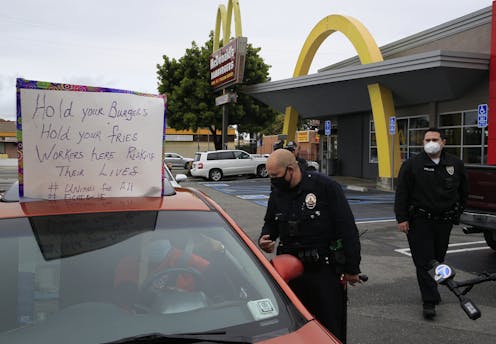Unionized workers are more likely to assert their right to a safe and healthy workplace
- Written by Aaron Sojourner, Associate Professor and Labor Economist, University of Minnesota

The Research Brief[1] is a short take about interesting academic work.
The big idea
Unionized workers are more likely than their non-union peers to speak up about health and safety problems in the workplace, according to a just-published, peer-reviewed study I conducted with Jooyoung Yang[2], who was a Ph.D. student in applied economics at the time of the research.
To reach this conclusion, we examined over 70,000 unionization votes from 1985 to 2009 and focused on elections where the tally in favor or against was very small. This allowed us to zero in on the impact of unionization itself on worker behavior. We then compared these workplaces with the number of inspections conducted by state or federal occupational health and safety enforcement agencies that resulted from an employee complaint. We found that unionized workplaces were 30% more likely to face an inspection for a health or safety violation.
The likely reasons why, in my view, are that unions can help organized workers learn about their rights[3], file complaints and provide greater protections against illegal retaliation by employers.
[Deep knowledge, daily. Sign up for The Conversation’s newsletter[4].]
Why it matters
The health and safety of workers is always a concern, but the current pandemic makes the issue more important than ever, especially for essential workers in health care[5], retail[6] and child care centers and schools[7]. But beyond them, all workers – including those with typically safe office jobs – are at increased risk of catching the coronavirus.
The costs of providing sufficient protective gear or taking other steps to ensure worker safety can be high, which means some companies have at times resisted[8] doing all they can to protect their employees[9]. What’s more, they are trying to prevent[10] their workers from learning about cases of coronavirus in their workplace and have been lobbying governments[11] for immunity from any liability.
That means it’s even more vital that workers are able to raise their voices when they feel that their workplace is unsafe. Our research suggests belonging to a union can play a big role in ensuring those voices are heard.
This may also be why we’ve seen more workers going on strike[12] and asserting their rights[13] to safer and healthier workplaces.
What’s next
Currently, I am working on two related follow-up projects.
One aims to build[14] and analyze more comprehensive measures of labor rights violations by connecting records from the various federal agencies that protect workers, such as the U.S. Occupational Safety and Health Administration and the National Labor Relations Board. The other[15] studies how workers share information with one another about their employers on Glassdoor and how useful the job search site is to job seekers.
References
- ^ Research Brief (theconversation.com)
- ^ Jooyoung Yang (eng.kiet.re.kr)
- ^ learn about their rights (www.coshnetwork.org)
- ^ Sign up for The Conversation’s newsletter (theconversation.com)
- ^ health care (www.cdc.gov)
- ^ retail (www.cdc.gov)
- ^ child care centers and schools (www.cdc.gov)
- ^ some companies have at times resisted (www.vox.com)
- ^ protect their employees (www.theguardian.com)
- ^ they are trying to prevent (www.bloomberg.com)
- ^ have been lobbying governments (www.newyorker.com)
- ^ going on strike (www.vice.com)
- ^ asserting their rights (www.nytimes.com)
- ^ One aims to build (papers.ssrn.com)
- ^ The other (dx.doi.org)
Authors: Aaron Sojourner, Associate Professor and Labor Economist, University of Minnesota

